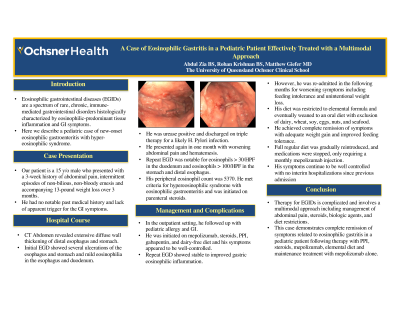Back


Poster Session A - Sunday Afternoon
Category: Pediatrics
A0618 - A Case of Eosinophilic Gastritis in a Pediatric Patient Effectively Treated With a Multimodal Approach
Sunday, October 23, 2022
5:00 PM – 7:00 PM ET
Location: Crown Ballroom

Has Audio

Abdul Zia, BS
UQ Ochsner Clinical School
New Orleans, LA
Presenting Author(s)
Abdul Zia, BS, Rohan Krishnan, BS, Matthew Giefer, MD
UQ Ochsner Clinical School, New Orleans, LA
Introduction: Eosinophilic gastrointestinal diseases (EGIDs) are a spectrum of rare, chronic, immune-mediated gastrointestinal disorders histologically characterized by eosinophilic-predominant tissue inflammation and GI symptoms. Here we describe a pediatric case of new-onset eosinophilic gastroenteritis with hyper-eosinophilic syndrome.
Case Description/Methods: Our patient is a 15 y/o male who presented with a 3-week history of intermittent episodes of non-bilious, non-bloody emesis and accompanying 13-pound weight loss over 3 months. He had no notable past medical history and lack of apparent trigger for the GI symptoms. Initial EGD showed several ulcerations of the esophagus and stomach and mild eosinophilia in the esophagus and duodenum. He was also urease positive. He was discharged on triple therapy for a likely H. Pylori infection. He presented again in one month with worsening abdominal pain and hematemesis. Repeat EGD was notable for eosinophils > 30/HPF in the duodenum and eosinophils > 100/HPF in the stomach and distal esophagus. His peripheral eosinophil count was 5370. He met criteria for hypereosinophilic syndrome with eosinophilic gastroenteritis and was initiated on parenteral steroids. In the outpatient setting, he followed up with pediatric allergy and GI. He was initiated on mepolizumab, steroids, PPI, gabapentin, and dairy-free diet and his symptoms appeared to be well-controlled. Repeat EGD showed stable to improved gastric eosinophilic inflammation. However, he was re-admitted in the following months for worsening symptoms including feeding intolerance and unintentional weight loss. His diet was restricted to elemental formula and eventually weaned to an oral diet with exclusion of dairy, wheat, soy, eggs, nuts, and seafood. He achieved complete remission of symptoms with adequate weight gain and improved feeding tolerance. Full regular diet was gradually reintroduced and medications were stopped, only requiring a monthly mepolizumab injection. He has recovered all lost weight and has no symptoms on mepolizumab monotherapy with pending endoscopy to assess for mucosal healing.
Discussion: Therapy for EGIDs is complicated and involves a multimodal approach including management of abdominal pain, steroids, biologic agents, and diet restrictions. This case demonstrates complete remission of symptoms related to eosinophilic gastritis in a pediatric patient following therapy with PPI, steroids, mepolizumab, elemental diet and maintenance treatment with mepolizumab alone.
Disclosures:
Abdul Zia, BS, Rohan Krishnan, BS, Matthew Giefer, MD. A0618 - A Case of Eosinophilic Gastritis in a Pediatric Patient Effectively Treated With a Multimodal Approach, ACG 2022 Annual Scientific Meeting Abstracts. Charlotte, NC: American College of Gastroenterology.
UQ Ochsner Clinical School, New Orleans, LA
Introduction: Eosinophilic gastrointestinal diseases (EGIDs) are a spectrum of rare, chronic, immune-mediated gastrointestinal disorders histologically characterized by eosinophilic-predominant tissue inflammation and GI symptoms. Here we describe a pediatric case of new-onset eosinophilic gastroenteritis with hyper-eosinophilic syndrome.
Case Description/Methods: Our patient is a 15 y/o male who presented with a 3-week history of intermittent episodes of non-bilious, non-bloody emesis and accompanying 13-pound weight loss over 3 months. He had no notable past medical history and lack of apparent trigger for the GI symptoms. Initial EGD showed several ulcerations of the esophagus and stomach and mild eosinophilia in the esophagus and duodenum. He was also urease positive. He was discharged on triple therapy for a likely H. Pylori infection. He presented again in one month with worsening abdominal pain and hematemesis. Repeat EGD was notable for eosinophils > 30/HPF in the duodenum and eosinophils > 100/HPF in the stomach and distal esophagus. His peripheral eosinophil count was 5370. He met criteria for hypereosinophilic syndrome with eosinophilic gastroenteritis and was initiated on parenteral steroids. In the outpatient setting, he followed up with pediatric allergy and GI. He was initiated on mepolizumab, steroids, PPI, gabapentin, and dairy-free diet and his symptoms appeared to be well-controlled. Repeat EGD showed stable to improved gastric eosinophilic inflammation. However, he was re-admitted in the following months for worsening symptoms including feeding intolerance and unintentional weight loss. His diet was restricted to elemental formula and eventually weaned to an oral diet with exclusion of dairy, wheat, soy, eggs, nuts, and seafood. He achieved complete remission of symptoms with adequate weight gain and improved feeding tolerance. Full regular diet was gradually reintroduced and medications were stopped, only requiring a monthly mepolizumab injection. He has recovered all lost weight and has no symptoms on mepolizumab monotherapy with pending endoscopy to assess for mucosal healing.
Discussion: Therapy for EGIDs is complicated and involves a multimodal approach including management of abdominal pain, steroids, biologic agents, and diet restrictions. This case demonstrates complete remission of symptoms related to eosinophilic gastritis in a pediatric patient following therapy with PPI, steroids, mepolizumab, elemental diet and maintenance treatment with mepolizumab alone.
Disclosures:
Abdul Zia indicated no relevant financial relationships.
Rohan Krishnan indicated no relevant financial relationships.
Matthew Giefer indicated no relevant financial relationships.
Abdul Zia, BS, Rohan Krishnan, BS, Matthew Giefer, MD. A0618 - A Case of Eosinophilic Gastritis in a Pediatric Patient Effectively Treated With a Multimodal Approach, ACG 2022 Annual Scientific Meeting Abstracts. Charlotte, NC: American College of Gastroenterology.
